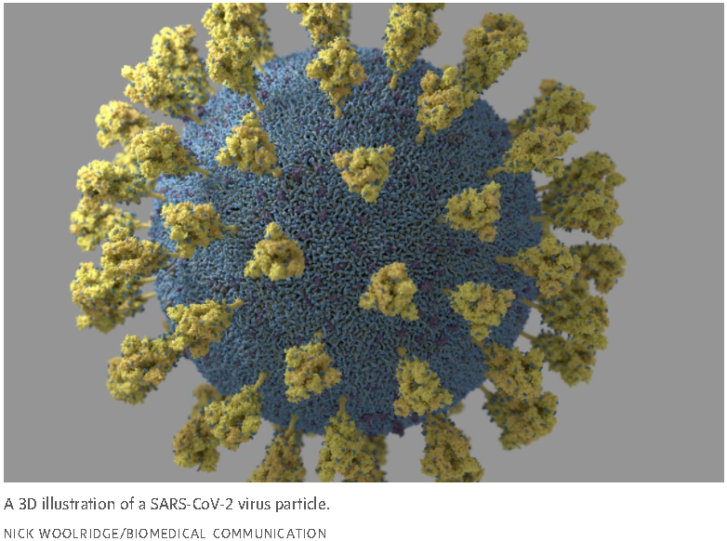While the fourth wave of the pandemic surges in Canada, scientists are on the watch for new variants of the virus that causes COVID-19. Any one of those could be the harbinger of a fifth wave later this fall or winter if it can successfully outcompete the Delta variant that is currently responsible for the majority of new cases across the country.
The latest variant to step into the spotlight is known by the Greek letter “Mu”. On August 30, the World Health Organization added Mu to its list of “variants of interest” — meaning variants with mutations that have previously been associated with greater disease transmissibility or severity, reduced immunity from the virus, or reduced success of therapies or diagnostics. A variant of interest is also one that has been identified with one or more significant outbreaks, which suggests it is “an emerging threat to global public health,” according to the WHO.
That is still one step short of a “variant of concern”. That category, which includes Delta, is reserved for variants of interest that have gained a genuine evolutionary advantage over previous versions of the virus, based on comparative studies.
The reason WHO flagged Mu is that it carries mutations that may help it evade the immune responses of vaccinated individuals. Some of those mutations are also found on the Beta variant, the one that has so far been shown to cut most deeply into vaccine effectiveness in studies. It also shares a mutation with the Alpha variant that could boost its transmissibility. But it will take time to understand if these genetic changes are enough to reignite the pandemic as Delta has.
First spotted in Columbia last January, the Mu variant has been in the United States at least since March and it has also been identified in multiple countries across the Americas and Europe, along with Japan and South Korea. In Canada it has so far been identified in about 200 cases and its share of total cases had waned to a fraction of one percent.
So far neither Mu or Lambda — another variant of interest that was designated in June — appear to have the edge on Delta. However, both have been found circulating at low levels in Canada. (So have an additional nine known variants of interest that have received less attention.) Their presence is a reminder that despite Canada’s relatively high vaccination rate, variants will continue to emerge as long as a large share of the world’s population remains unvaccinated.
Here’s a look at the other variants and their designations:

Which COVID-19 variants are in Canada?
LAMBDA VARIANT (C.37) – VARIANT OF INTEREST
- Country of origin: Peru
- Traits: Spreads more easily. Health officials had been monitoring it since last August, but the WHO only designated it a variant of concern in June of 2021.
- Spread in Canada: A handful of travel-related cases were first detected in early July.
DELTA VARIANT (B.1.617 AND B.1.617.2) – VARIANT OF CONCERN
- Country of origin: India
- Traits: Spreads more easily. Single-dosed people are less protected against it than those with both vaccine doses.
- Spread in Canada: All but a few provinces have recorded cases, but B.C.’s total has been the largest so far.
ALPHA VARIANT (B.1.1.7) – VARIANT OF CONCERN
- Country of origin: Britain
- Traits: Pfizer-BioNTech and Moderna vaccines are still mostly effective against it, studies suggest, but for full protection, the booster is essential: With only a first dose, the effectiveness is only about 66 per cent.
- Spread in Canada: First detected in Ontario’s Durham Region in December. It is now Canada’s most common variant type. Every province has had at least one case; Ontario, Quebec and the western provinces have had thousands.
BETA VARIANT (B.1.351) – VARIANT OF CONCERN
- Country of origin: South Africa
- Traits: Some vaccines (including Pfizer’s and Oxford-AstraZeneca’s) appear to be less effective but researchers are still trying to learn more and make sure future versions of their drugs can be modified to fight it.
- Spread in Canada: First case recorded in Mississauga in February. All but a few provinces have had at least one case, but nowhere near as many as B.1.1.7.
GAMMA (P.1) – VARIANT OF CONCERN
- Country of origin: Brazil
- Traits: Potentially able to reinfect people who’ve recovered from COVID-19.
- Spread in Canada: B.C. has had hundreds of cases, the largest known concentration of P.1 outside Brazil. More outbreaks have been detected in Ontario and the Prairies.
IF I’M SICK, HOW DO I KNOW WHETHER I HAVE A COVID-19 VARIANT?
Health officials need to genetically sequence test samples to see whether it’s the regular virus or a variant, and not everyone’s sample will get screened. It’s safe to assume that, whatever the official variant tallies are in your province, the real numbers are higher. But for your purposes, it doesn’t matter whether you contract a variant or not: Act as though you’re highly contagious, and that you have been since before your symptoms appeared (remember, COVID-19 can be spread asymptomatically). Self-isolate for two weeks. If you have the COVID Alert app, use it to report your test result so others who may have been exposed to you will know to take precautions.
Article From: Globe and Mail
Author: EXPLAINER

